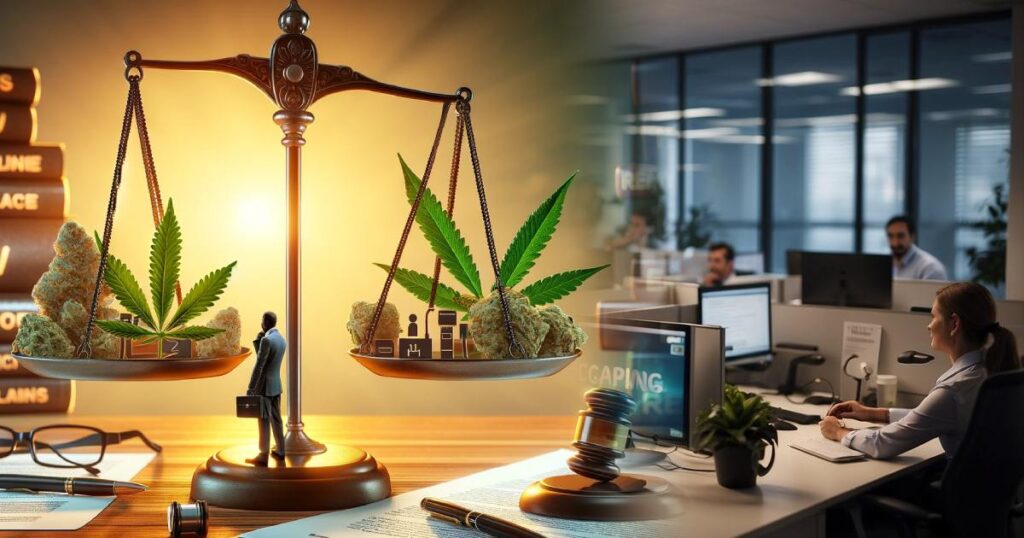Cannabis Vape in the Workplace: Navigating Legal and Policy Issues
The integration of cannabis into society has brought many changes, notably in the workplace, where employers and employees must navigate this new reality. With the rise of vaping as a popular method of consumption, cannabis vaping in the workplace emerges as a significant topic of discussion. As an employee or employer, you should be aware of the regulations and policies that govern the use of such substances on the job. The matter is legal and pertains to workplace safety, productivity, and culture.
Understanding your rights and the company policies is a prerequisite as the legal landscape around cannabis continues to evolve. While some states have legalized cannabis, it remains illegal under federal law, leading to potential conflicts in workplace policy enforcement. The use of cannabis vape at work can lead to questions about impairment, productivity, and the impact on overall workplace dynamics.
Key Takeaways
- Cannabis vape use in the workplace is subject to state and federal laws, as well as individual company policies.
- Employers must balance legal compliance with maintaining a safe and productive work environment.
- Employees should familiarize themselves with their rights and their employer’s policies regarding cannabis consumption.
Regulatory Landscape and Employer Considerations
Navigating the evolving regulatory landscape of cannabis vape use, such as Ypsilos products, is crucial for maintaining compliance and ensuring workplace safety. As an employer, your policies must adapt to the diverse state statutes while respecting federal guidelines.
State Laws and Federal Stance
State laws regarding cannabis use have varied greatly, with many states, including California, Colorado, and New York, legalizing marijuana for medical or recreational use. States such as Nevada, Arizona, and Illinois have specific laws protecting employees’ off-duty cannabis use. However, under federal law, cannabis continues to be classified as a Schedule I substance. This federal classification creates complexities for employers in balancing compliance with state and federal regulations.
Developing Workplace Cannabis Policies
Your workplace cannabis policies should reflect an understanding of state and federal laws. Ensure that you write policies to manage employees’ use of cannabis, especially vaping on the job, which may impair performance. Consider the legalities and restrictions of drug testing in your state when implementing drug testing policies.
Addressing Safety, Health, and Impairment
Workplace safety is paramount. You must address safety concerns associated with cannabis impairment that may increase the risk of accidents and injuries. The National Institute for Occupational Safety and Health (NIOSH) provides resources to evaluate health hazards and maintain worker safety. It’s critical to understand how THC, the psychoactive component of cannabis vape, might impair motor functions and cognition.
Legal Implications and Protections
It’s essential to consider the legal implications of disciplining or terminating employees based on cannabis use. Anti-discrimination laws in some states protect medical cannabis users, and certain states prohibit employers from penalizing employees for legal off-duty conduct. Stay informed on the protections in the jurisdictions where you operate to avoid potential liability.
Impacts on Workplace Dynamics and Culture
Cannabis use in the workplace, mainly vaping, can significantly affect multiple aspects of the work environment, from productivity and performance to overall safety and health conditions.
Influences on Productivity and Performance
Cannabis vaping can influence your productivity and performance at work. Cannabis, mainly containing THC, can cause impairment, leading to a high state that may hinder your cognitive functions and physical coordination. This impairment can compromise your ability to accomplish tasks effectively and safely. Moreover, the effects on productivity can be broader, potentially leading to increased absenteeism and reduced overall workplace output.
Ensuring a Safe and Healthy Work Environment
Maintaining a safe and healthy workplace is paramount, including managing air quality. Cannabis vape aerosols can introduce particulate matter into indoor air, potentially affecting not just the user but also other employees’ workplace health. Employers must address these factors within their occupational safety and health protocols and align with standards set by organizations like OSHA and NIOSH to prevent health hazards.
Adapting to Changing Attitudes and Demographics
Demographic shifts and evolving attitudes toward cannabis legalization have implications for workplace culture. You may witness a growing acceptance of medical and recreational cannabis use, influencing organizational policies. Companies must calibrate their drug testing practices and resources to balance respect for legitimate medical cannabis use against enforcing a drug-free work setting.
Technological and Methodological Developments
Technological advancements offer new methods for detecting impairment and ensuring workplace safety. Developments in drug testing can help your employer determine recent use, though distinguishing impairment levels remains complex. Employers might also utilize technology to provide training and resources to educate you on the impact of cannabis vaping on your well-being and workplace performance.
Frequently Asked Questions
In the evolving landscape of cannabis legality, your concerns about cannabis vape in the workplace touch on important issues such as employment policies, productivity, and your rights as a worker.
Can an employee be terminated for using a cannabis vape while on the job?
Yes, the company can terminate you for using a cannabis vape. At the same time, on the job, most employers maintain drug-free workplace policies that prohibit the use of intoxicants during work hours, including cannabis, regardless of its legal status.
Is it considered gross misconduct to vape cannabis in the workplace?
Vaping cannabis in the workplace can be considered gross misconduct. Companies have the right to enforce strict no-drug policies, and any violation can lead to serious disciplinary actions, including termination.
Are there any legal protections for using CBD oil at work?
State and local laws vary in their provision of legal protections for using CBD oil at work. Doctors sometimes prescribe CBD oil for a medical condition, making it permissible. Still, you should consult your company’s policy and your state’s regulations to understand your legal standing.
How long can CBD be detected in an individual’s system?
Generally, an individual’s system can detect CBD for two to five days. However, this can vary depending on several factors, such as the quantity used, frequency of use, and the individual’s metabolism.
Will using CBD products affect the status of federal employees?
Federal laws hold federal employees accountable for the illegality of cannabis and its derivatives, such as CBD. Usage of CBD products can affect your status as a federal employee and may lead to disciplinary action or termination.
Can the odor of cannabis vaping be detected in the workplace environment?
In the workplace environment, people can detect the odor of cannabis vaping. This can raise concerns among co-workers and employers, potentially leading to disciplinary measures if they violate workplace policy.





